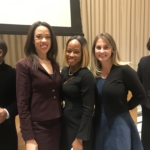
Lilian Ajayi-Ore’s speech at the United Nations’ International Day of Education event on November 30th, 2018.
The TRANSCRIPT of Lilian Ajayi-Ore’s speech at the United Nations’ International Day of Education event on Friday, November 30th, 2018.
Good Afternoon
Your Excellencies,
Distinguished Guests,
Ladies, and Gentlemen.
Thank you for the honor of addressing the United Nations in observance of the International Day for Education at the Trusteeship Council.
The truth is the first time I was in this room, I served as a young delegate working at the Permanent Mission of Nigeria to the United Nations. In this very room was when I first heard the late Kofi Annan speak on the importance of economic prosperity for all and education for all. He states, ”Knowledge is power. Information is liberating. Education is the premise of progress, in every society, in every family.”
As a mother, educator, digital transformation enthusiast, humanitarian, scholar, and the Founder and Executive Director of the Global Connections for Women Foundation, equity in the distribution of digital learning and education is critical. For 346 million youth worldwide are not online, and 60% of African youth have zero access to the web.
It was revealed that globalization and digital transformation for learning while bringing prosperity and progress, has widened the digital divide. While open markets, greater access to goods and services, and new technology have increased levels of global economic integration, it also left evidence as insufficient in creating a truly equitable global society.
In over two decades, the call to action has become a multi-stakeholder partnership in which participants work to advance the underlying principle of the UN sustainable development goals which is to leave no one left behind.
Your Excellencies, Ladies, and gentlemen,
All of us — the private sector, civil society, labor unions, NGOs, universities, foundations, and individuals — must come together in an alliance for progress in creating equity in education.
The digital divide is often characterized by low levels of access to technologies. The factors that impede access to ICT infrastructure, especially in developing countries are poverty, illiteracy, lack of computer literacy and language barriers. With nearly 70 percent of the world’s websites are in English.
I had the privilege of working on various initiatives which recognized the role of public and private sector partnerships in strengthening the global distribution of access to quality education using technology. One such partnership was through Microsoft education – Skype in the classroom. The platform provides access to digital learning resources to over 5 million teachers worldwide.
As we move forward in the spirit of shared responsibility, we should see it as our duty to use the resources to pass knowledge, technology, and training along to the communities that we both operate in and its surrounding communities.
Your Excellencies, Ladies, and Gentlemen.
The late Kofi Annan once said, “together, we can and must move from value to values, from shareholders to stakeholders, and from balance sheets to balanced development.”
For the sustainable development goals especially goal 4 to be realized, we must learn to face the uncertainties ahead and bring solutions within reach to leave no one behind in education and in the digital transformation. Public-private partnerships can improve accessibility and delivery of digital educational content, increase access to finance, transform business across entire regions, and create much-needed jobs.
The IMF predicts that seven out of the ten fastest-growing economies in the world in the coming years will be in Africa. However, the continent is among the most unequal societies in the world. And, in the midst of significant demographic change as Africa’s population is growing faster than any other region. 65% of all Africans are now under the age of 35.
When these innovative partnerships are weave together the interests of local communities and the interests of private business, it equates to a mutually beneficial endeavor. The private sector can play an important role in building frameworks to ensure that this new investment can be replicated across sectors and spread across the region.
The challenge now is to learn from these successes and replicate and extend these partnerships through new networks, and across geographic regions.
I urge you to consider the manner in which you can benefit from both, and utilize your skills, resources, and competitive advantage to drive progress, and set a path for sustained economic growth and educational development.
I end with another quote from the late Kofi Annan stating ”Young people – with their dynamic energy and their inherent understanding of our interconnected world – have much to teach us. Increased educational attainment, advances in technology and the spread of information will make this generation the most educated, most connected and most informed in history.”
Thank you.






















